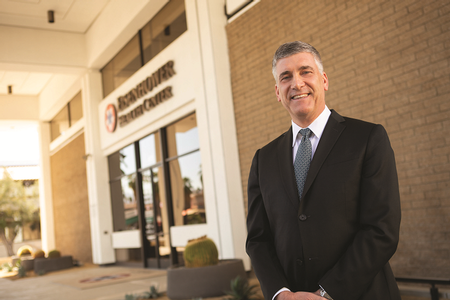



“WHILE THERE HAVE BEEN NO NEW DRUG APPROVALS, there are some promising developments,” says Dr. Young. “The most exciting development was announced in July 2018 at the Alzheimer’s Association International Conference in Chicago when Biogen® shared results from a Phase II trial of an experimental monoclonal antibody drug called BAN2401.
“Given to patients over 18 months, it appeared to clear betaamyloid and also slow the rate of mental decline,” he continues. “Patients also had slight improvement versus the placebo group on measures of cognitive impairment.” Beta-amyloid is a sticky substance that accumulates in the brains of people with Alzheimer’s disease, disrupting communication between brain cells and eventually killing them.
“This is the first time we’ve seen this,” Dr. Young says. “It’s far from a definitive cure, but it is exciting news and we’re cautiously optimistic.”
Dr. Young notes that there are other monoclonal antibody drugs under investigation, as well as a handful of what are called BACE inhibitors (BACE is an enzyme that breaks up beta-amyloid).
“Scientists also are studying some targeted therapies against tau protein, another substance that causes trouble in the brains of people with Alzheimer’s,” he says. “For many years, drug development has been focused on amyloid plaque, but now we’re also looking at tau. “These are the big things happening in scientific research today,” he adds, “but nothing new has been approved.
“It’s frustrating,” Dr. Young acknowledges. “We’re looking at seven million Americans who will have Alzheimer’s disease by 2025, and 40 percent of them will be over 85. As we live longer, more people will get this disease.” But there is good news.
“In this country, dementia appears to be on the downswing,” he says. “The incidence has been declining since the 1970s, and even though there are more people with Alzheimer’s disease as the older population grows, the actual incidence is lower.”
Why is that?
“There appears to be a reduction in the risk factors that contribute to the development of Alzheimer’s disease and dementia,” Dr. Young explains, referring to cerebrovascular conditions such as high blood pressure, high cholesterol, type 2 diabetes, a sedentary lifestyle and obesity.
“These cardiovascular risk factors go hand in hand with dementing illness,” he continues. “Yes, there are significant genetic factors in Alzheimer’s disease, but your genes are not your destiny. We can modify the response of our genes, to get them to turn on later and later if we adopt healthy habits like exercising, not smoking, avoiding alcohol and controlling our blood pressure.” In other words, the lifestyle choices that contribute to heart health can help our brains stay healthy, too.
“There are some things that we do have control over,” Dr. Young stresses.
How are Alzheimer’s disease and dementia diagnosed — and when is the right time to seek an evaluation? “We don’t have a specific blood test or brain scan that’s 100 percent definitive, so it remains a clinical diagnosis,” Dr. Young replies, referring to a diagnosis based on a patient’s signs, symptoms and medical history.
“We also need to exclude other possible issues such as Parkinson’s disease, depression, untreated congestive heart failure or alcohol-related memory problems,” he continues.
“Scientists are working on a better PET scan to show if there’s an excessive amount of beta-amyloid, which is consistent with an Alzheimer’s disease diagnosis,” he adds. “And we’re getting closer to having a blood test that will reveal amyloid and tau protein markers quickly without scanning, which is exciting.”
As for when to seek an evaluation, Dr. Young says the right time is whenever someone starts to notice a change in what’s often referred to as executive function — the mental skills that help with things such as managing time, paying attention, switching focus, planning and organizing, and remembering details.
“We assess memory, language, attention and focus, and visual perception,” he explains. “If an individual is finding it difficult to follow through on a computer task, for example, or doesn’t realize that their cell phone isn’t the TV remote — that is when it’s time to come in.” He strongly cautions people to avoid the mail-in services that test DNA and purport to reveal one’s risk for certain diseases. “Those are more for entertainment value,” he says. “Don’t confuse them with science.
“Professional genetic testing can reveal a person’s risk level of Alzheimer’s, but 25 percent of those at the highest risk won’t develop the disease,” he stresses. “That — and the fact that there’s still no cure — is why we don’t recommend genetic testing for patients outside the research setting.”
What Dr. Young does recommend is that people have a good primary care physician who can monitor and help manage an individual’s risk factors.
“We have neurologists to help with assessments when needed, and we offer great support groups and a day care program,” he notes. “We also can help patients access clinical trials, and the Alzheimer’s Association® is a fantastic resource.
“There’s good stuff right here in your backyard,” he adds.
To find a primary care physician or neurologist, contact Eisenhower’s physician referral at 760.568.1234.